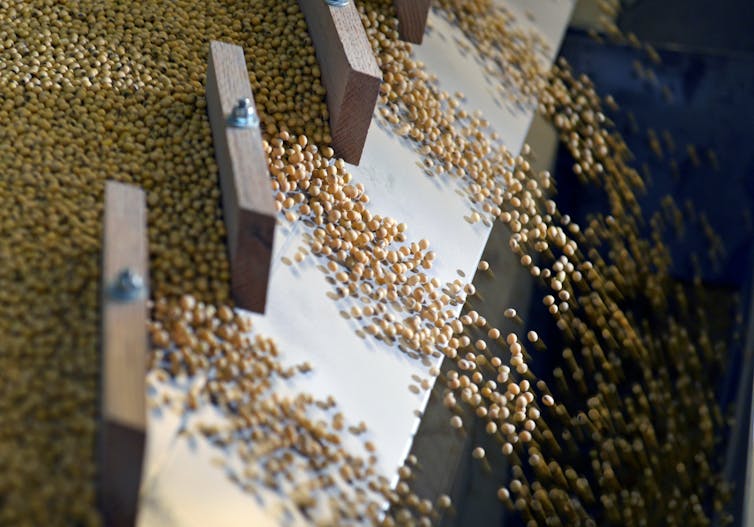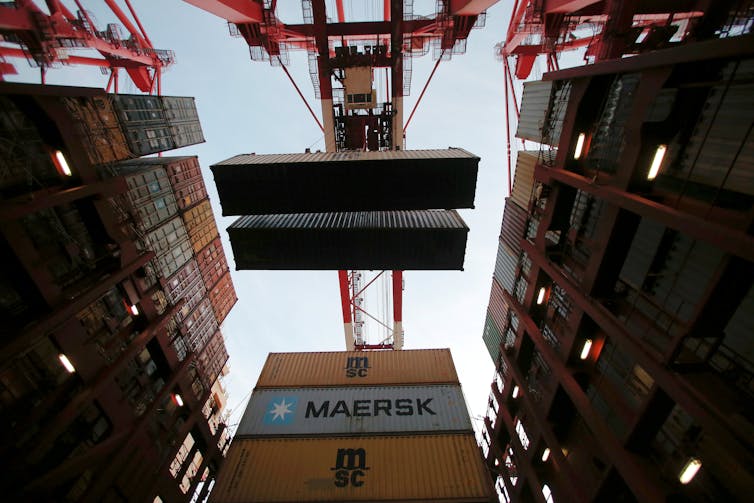The US-China trade war: 5 essential reads
- Written by Nicole Zelniker, Editorial Researcher, The Conversation
The U.S. has placed tariffs on more than US$250 billion[1] worth of Chinese goods and has threatened tariffs on another $300 billion[2].
China has retaliated, placing tariffs of their own on billions of dollars[3] worth of U.S. goods, including alcohol, fruit and pork[4].
Experts call it a trade war.
These five stories from The Conversation archives will help readers better understand what that a trade war is and what might happen next.
1. What is a tariff?
Amitrajeet A. Batabyal[5], an economist at the Rochester Institute of Technology, defines a tariff as “a tax levied on an imported good[6].”
In this case, Batabyal writes, the U.S. placing tariffs on China will make Chinese goods more expensive in the U.S.
But tariffs “are not implemented in a vacuum,” he writes, meaning that aggressive steps by the U.S. will likely be matched by China.
2. Mistakes were made
The inside of an iPhone gives some insight into the futility of this escalating spat.
Three scholars – Jason Dedrick[7] from Syracuse University, Greg Linden[8] from the University of California, Berkeley, and Kenneth L. Kraemer[9] from the University of California, Irvine – tell us that “China gets less value from its iPhone exports than you might think[10]” – with or without a Trump tariff.
Trump said in June that he planned to put 25% tariffs on $300 billion in imports from China, including iPhones, but many of the parts that make up an iPhone are made in Japan, South Korea, Taiwan and even the U.S.
In short, as the scholars write, “China gets a lot of low-paid jobs, while the profits flow to other countries.”
 U.S. soybean exports to all countries fell to about $15 billion from July 2018 to May 2019.
Reuters/Dan Koeck[11]
U.S. soybean exports to all countries fell to about $15 billion from July 2018 to May 2019.
Reuters/Dan Koeck[11]
3. Floundering farmers
In this war, China has come up with an unexpected weapon: soybeans.
China, formerly the biggest buyer of soybeans in the world, “has reportedly stopped purchasing any American soybeans[12]” according to Ian Sheldon[13], the agricultural marketing, trade and policy chair at The Ohio State University.
This is “in retaliation for the Trump administration raising tariffs on US$250 billion of Chinese goods,” he writes.
As Sheldon puts it, “This is very bad news for U.S. farmers.”
4. The last resort
In part because of the trade war, Rodney Ramcharan[14], professor of finance and business economics at the University of Southern California, notes that the U.S. economy is slowing[15].
This has led the federal reserve to lower short-term interest rates for the first time in over a decade.
Ramcharan writes, “Given that it’s forced to do so by Trump’s own policies, the central bank is essentially signaling it’s now the administration’s insurer of last resort.”
Since the state of the economy traditionally plays a large role in U.S. elections, Ramcharan writes that the Fed’s willingness to lower short-term interest rates could help sway the 2020 presidential election in Trump’s favor.
 Tariffs have disrupted international supply lines and roiled global financial markets.
Reuters/Aly Song[16]
Tariffs have disrupted international supply lines and roiled global financial markets.
Reuters/Aly Song[16]
5. Not the end
The next question is: Is there an end in sight? Charles Hankla[17], a political scientist from Georgia State University, says no[18].
Instead, he writes that a trade war can only be won if “the country has more bargaining leverage than its opponent – in other words when it can impose more pain on its adversary than it experiences itself.”
Neither the U.S. nor China has that leverage, he says.
Hankla continues, “Since neither side is clearly winning or losing, we have probably not seen the end of this conflict.”
Editor’s note: This article is a roundup of stories from The Conversation’s archive.
[ Deep knowledge, daily. Sign up for The Conversation’s newsletter[19]. ]
References
- ^ more than US$250 billion (econofact.org)
- ^ on another $300 billion (uk.reuters.com)
- ^ billions of dollars (www.cnbc.com)
- ^ including alcohol, fruit and pork (qz.com)
- ^ Amitrajeet A. Batabyal (scholar.google.com)
- ^ a tax levied on an imported good (theconversation.com)
- ^ Jason Dedrick (scholar.google.com)
- ^ Greg Linden (www.irle.berkeley.edu)
- ^ Kenneth L. Kraemer (www.researchgate.net)
- ^ China gets less value from its iPhone exports than you might think (theconversation.com)
- ^ Reuters/Dan Koeck (pictures.reuters.com)
- ^ stopped purchasing any American soybeans (theconversation.com)
- ^ Ian Sheldon (scholar.google.com)
- ^ Rodney Ramcharan (scholar.google.com)
- ^ the U.S. economy is slowing (theconversation.com)
- ^ Reuters/Aly Song (pictures.reuters.com)
- ^ Charles Hankla (scholar.google.com)
- ^ says no (theconversation.com)
- ^ Sign up for The Conversation’s newsletter (theconversation.com)
Authors: Nicole Zelniker, Editorial Researcher, The Conversation
Read more http://theconversation.com/the-us-china-trade-war-5-essential-reads-121476

